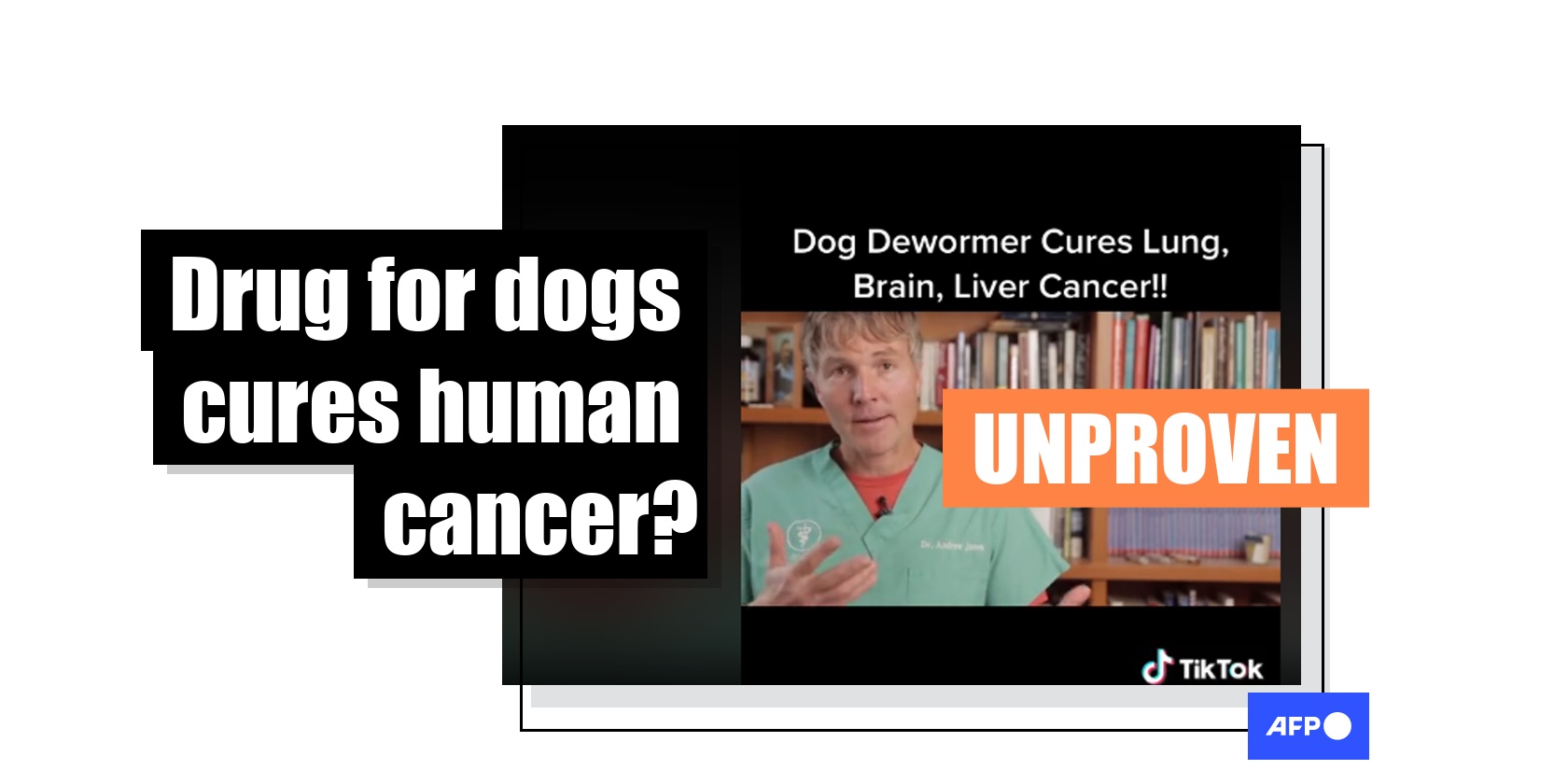
Deworming drug misleadingly touted as cancer cure
- This article is more than two years old.
- Published on April 25, 2023 at 22:31
- 3 min read
- By Gwen Roley, AFP Canada
"Cure for advance lung cancer #truthhurtssometimes," claims the caption of an April 9 Facebook reel with more than 61,000 views.
It reposts a portion of a TikTok video in which Andrew Jones, a veterinarian from British Columbia, describes the case of a lung cancer patient who pursued treatment with the dog deworming drug fenbendazole, under the commercial brand Panacur.
Jones stated that following a few months of treatment with the drug the patient was "found to be completely cancer free," a claim viewed more than 11,000 times since it was posted on February 3, 2023.

Fenbendazole is an anthelmintic, used to treat parasites in animals. Peer-reviewed studies have examined these drugs and others in the same category as potential anti-cancer treatments, but none have found enough evidence to confirm they could cure cancer in humans.
"Seeing promising data in a dish of cancer cells is the beginning," said Sheila Singh, the director of the Centre for Discovery in Cancer Research at McMaster University. "But to say that something could cure cancer is simply unscientific, because there's no data that backs up that claim whatsoever."
Jones was officially reprimanded in September 2010 by the College of Veterinarians of British Columbia (CVBC) for promoting alternative medicine for animals while openly criticizing the college. After the reprimand, Jones resigned from the college and continued to promote natural and alternative pet remedies through his brand "Veterinary Secrets."
Jones is open about the conflict and severing of ties with the CVBC on his YouTube channel. AFP contacted the CVBC for comment and was directed to its official online registry, where Jones does not appear.
Origin of Jones' claim
The TikTok and Facebook posts take clips from a longer video posted on Jones' channel in 2019 in which he discussed the case of Joe Tippens which had been publicized earlier that same year. Tippens was a cancer patient who told news outlets that after taking fenbendazole he was rid of a rare case of small-cell lung cancer.
Other researchers pointed out that Tippens received immuno-cancer treatments in a clinical trial, in addition to fenbendazole.
In Jones' video, he goes on to discuss and share some of the studies looking at the potential of the drug, and suggests the dosage patients could expect doctors would recommend when changing the use of fenbendazole from animals to humans.
However, Singh said there would not be any instance where she would prescribe a drug like fenbendazole to humans.
Health Canada lists all fenbendazole products as only for veterinary use, not for use in humans.
Experiments ongoing
A 2013 study from researchers at Yale University and Hubei University in China researching the effects of the drug on tumors in mice found no evidence that fenbendazole could treat cancer in humans, but mentioned that anthelmintics as an anti-cancer therapy merited further investigation.
South Korean researchers at Seoul National University published a paper in 2020 in the Journal of Korean Medical Science. It said that although evidence is still not conclusive, animal anthelmintics could have anti-cancer effects.
Some of the mechanisms that drive parasites are also active in cancer cells, Singh said, making antiparasitics a possible anti-cancer treatment, but the journey from preclinical evidence to a proven treatment can take up to 25 years.
Variations of albendazole and mebendazole have begun clinical trials testing, but have not yet been proven to be effective.
"The drug is still experimental the entire time. From the lab, from the preclinical models, all the way to the end, that drug is still not proven," Singh said.
More of AFP's reporting on health misinformation can be found here.
Copyright © AFP 2017-2026. Any commercial use of this content requires a subscription. Click here to find out more.
Is there content that you would like AFP to fact-check? Get in touch.
Contact us
